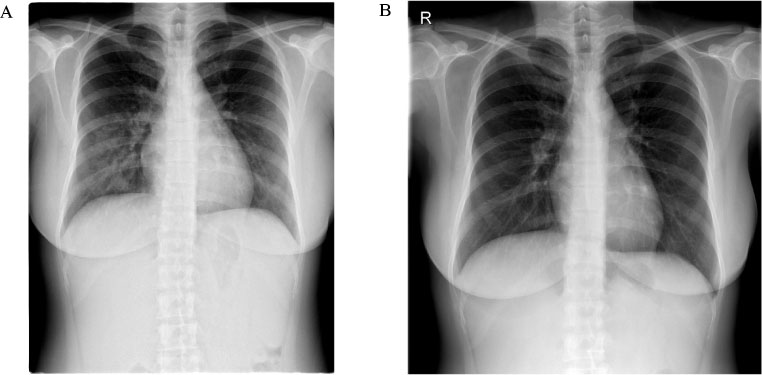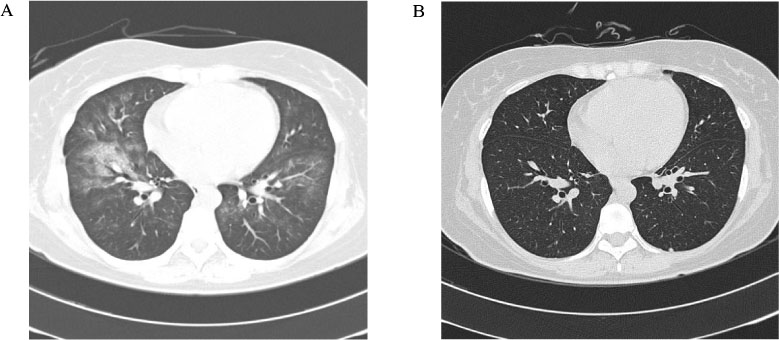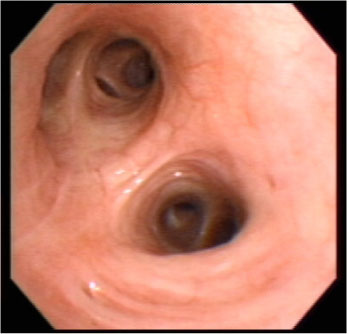J Korean Endocr Soc.
2007 Jun;22(3):215-219. 10.3803/jkes.2007.22.3.215.
A Case of Antineutrophil Cytoplasmic Antibody (ANCA) Positive, Propylthiouracil-Induced Diffuse Alveolar Hemorrhage in Graves' Disease
- Affiliations
-
- 1Department of Internal Medicine, The Catholic University College of Medicine, Korea.
- KMID: 1512034
- DOI: http://doi.org/10.3803/jkes.2007.22.3.215
Abstract
- Graves' disease is one of the common autoimmune diseases, and it has been controlled by such antithyroid drugs as propylthiouracil (PTU) or methimazole. There are a number of side effects, including agranulocytosis, skin rash, hepatotoxicity, fever, arthralgia and a lupus-like syndrome during treatment. PTU has been recently observed to be associated with the development of antineutrophil cytoplasmic antibody (ANCA) positive vasculitis, and this can cause diffuse alveolar hemorrhage. A 32-year-old woman with Graves' disease had been treated with PTU for 4 years, and she had experienced intermittent hemoptysis for 2 weeks before she visited the hospital. Both myeloperoxidase and proteinase 3 ANCA were positive without other organ systems being involved. She was diagnosed with PTU-induced vasculitis. Cessation of PTU and administration of corticosteroids improved the clinical manifestations.
Keyword
MeSH Terms
-
Adrenal Cortex Hormones
Adult
Agranulocytosis
Antibodies, Antineutrophil Cytoplasmic*
Antithyroid Agents
Arthralgia
Autoimmune Diseases
Exanthema
Female
Fever
Graves Disease*
Hemoptysis
Hemorrhage*
Humans
Methimazole
Myeloblastin
Peroxidase
Propylthiouracil
Vasculitis
Adrenal Cortex Hormones
Antibodies, Antineutrophil Cytoplasmic
Antithyroid Agents
Methimazole
Myeloblastin
Peroxidase
Propylthiouracil
Figure
Reference
-
1. Berkman EM, Orlin JB, Wolfsdorf J. An anti-neutrophil antibody associated with a propylthiouracil-induced lupus-like syndrome. Transfusion. 1983. 23:135–138.2. Dhillon SS, Singh D, Doe N, Qadri AM, Ricciardi S, Schwarz MI. Diffuse alveolar hemorrhage and pulmonary capillaritis due to propylthiouracil. Chest. 1999. 116:1485–1488.3. Yamauchi K, Sata M, Machiya J, Osaka D, Wada T, Abe S, Otake K, Kubota I. Antineutrophil cytoplasmic antibody positive alveolar haemorrhage during propylthiouracil therapy for hyperthyroidism. Respirology. 2003. 8:532–535.4. Lee SY, Jung JY, Lee KJ, Lee SH, Kim SJ, Lee EJ, Hur GY, Jung HC, Kim JH, Shin C, Shim JJ, In KH, Kang KH, Yoo SH. A case of propylthiouracil induced diffuse pulmonary hemorrhage. Tuberc Respir Dis. 2005. 58:78–82.5. Kang AY, Baek YH, Sohn YJ, Lee SK, Son CH, Kim K, Yang DK. Diffuse alveolar hemorrhage associated with antineutrophil cytoplasmic antibody levels in a pregnant woman taking propylthiouracil. Korean J Intern Med. 2006. 21:240–243.6. Dolman KM, Gans RO, Vervaat TJ, Zevenbergen G, Maingay D, Nikkels RE, Donker AJ, von dem Borne AE, Goldschmeding R. Vasculitis and antineutrophil cytoplasmic autoantibodies associated with propylthiouracil therapy. Lancet. 1993. 342:651–652.7. Romas E, Henderson DR, Kirkham BW. Propylthiouracil therapy: an unusual cause of antineutrophil cytoplasmic antibody associated alveolar hemorrhage. J Rheumatol. 1995. 22:803.8. Ohtsuka M, Yamashita Y, Doi M, Hasegawa S. Propylthiouracil-induced alveolar haemorrhage associated with antineutrophil cytoplasmic antibody. Eur Respir J. 1997. 10:1405–1407.9. Harper L, Cockwell P, Savage CO. Case of propylthiouracil-induced ANCA associated small vessel vasculitis. Nephrol Dial Transplant. 1998. 13:455–458.10. Yoshitaka N, Takayuki T, Yasushi I, Kenji S. Propylthiouracil (PTU)-induced vasculitis associated with antineutrophil antibody against myeloperoxidase (MPO-ANCA). Int Med. 2003. 42:529–533.11. Gunton JE, Stiel J, Caterson RJ, McElduff Al. Clinical case seminar: anti-thyroid drugs and antineutrophil cytoplasmic antibody positive vasculitis. a case report and review of the literature. J Clin Endocrinol Metab. 1999. 84:13–16.12. Harper L, Chin L, Daykin J, Allahabadia A, Heward J, Gough SC, Savage CO, Franklyn JA. Propylthiouracil and carbimazole associated-antineutrophil cytoplasmic antibodies (ANCA) in patients with Graves' disease. Clin Endocrinol. 2004. 60:671–675.13. Jiang X, Khursigara G, Rubin RL. Transformation of lupus-inducing drugs to cytotoxic products by activated neutrophils. Science. 1994. 266:810–813.14. von Schmiedeberg S, Goebel C, Gleichmann E, Uetrecht J. Neutrophils and drug metabolism. Science. 1995. 268:585–586.15. Choi HK, Merkel PA, Tervaert JW, Black RM, McCluskey RT, Niles JL. Alternating antineutrophil cytoplasmic antibody specificity: drug-induced vasculitis in a patient with Wegener's granulomatosis. Arthritis Rheum. 1999. 42:384–388.16. Hogan SL, Nachman PH, Wilkman AS, Jennette JC, Falk RJ. Prognostic markers in patients with antineutrophil cytoplasmic autoantibody-associated microscopic polyangitis and glomerulonephritis. J Am Soc Nephrol. 1996. 7:23–32.
- Full Text Links
- Actions
-
Cited
- CITED
-
- Close
- Share
- Similar articles
-
- Propylthiouracil-Induced ANCA-Positive Diffuse Alveolar Hemorrhage in a Patient with Thyroid Storm
- A Case of p-ANCA-Positive Propylthiouracil-Induced Pyoderma Gangrenosum
- A Case of Propylthiouracil Induced Diffuse Pulmonary Hemorrhage
- A Case of Diffuse Alveolar Hemorrhage with Glomerulonephritis after Propylthiouracil Treatment
- A Case of Propylthiouracil-induced Lupus Erythematosus Accompanied by Antineutrophil Cytoplasmic Antibody-positive Vasculitis




